Discover winter grooming and care for husky newcomers to keep your pet healthy and happy during the colder months.
| Quick Fact Name | Data |
|---|---|
| Coat Brushing Frequency | 2-3 times per week |
| Bathing | Every 3-4 months or as needed |
| Paw Care | Check and clean paws after outdoor activities |
| Nail Trimming | Once a month or as needed |
| Exercise Requirements | At least 30 minutes to 2 hours daily |
| Winter Coat | Double-coated, with a dense undercoat for insulation |
| Shedding | Heaviest during the spring and fall |
| Feeding | High-quality dog food, portion varies by activity level |
| Cold Tolerance | Can tolerate temperatures as low as -60°F (-51°C) |
| Health Check-Ups | At least once a year with a veterinarian |
| Common Health Issues | Hip dysplasia, eye problems, and skin issues |
Huskies have a unique double-layered coat that provides them with insulation against harsh winter conditions. The downy undercoat acts as an insulating layer, while the outer coat repels moisture and snow, keeping the husky warm and dry.
It’s crucial to maintain this coat properly throughout the winter season to ensure the husky’s comfort and well-being. Regular brushing helps to remove loose fur, prevent matting, and stimulate the natural oils in the coat, contributing to its insulating properties.
Additionally, a well-maintained coat allows for better air circulation, which is essential for regulating body temperature in varying outdoor conditions. Therefore, winter grooming and care for husky newcomers should prioritize maintaining the integrity of their double-layered coat to support their natural insulation and overall comfort.
Winter Grooming and Care for Husky Newcomers
It’s important to acknowledge the significance of the husky’s double-layered coat and the role it plays in providing insulation during the winter months. Regular brushing and maintenance are essential to support the coat’s insulating properties and contribute to the husky’s overall comfort and well-being.
Learning to maintain your husky's coat is just the first step in ensuring their well-being during the colder months. For a comprehensive guide on diet and nutrition to further enhance the health and quality of life for your mature husky companion, explore our detailed article, "Optimize Your Senior Husky's Health and Happiness Now!"
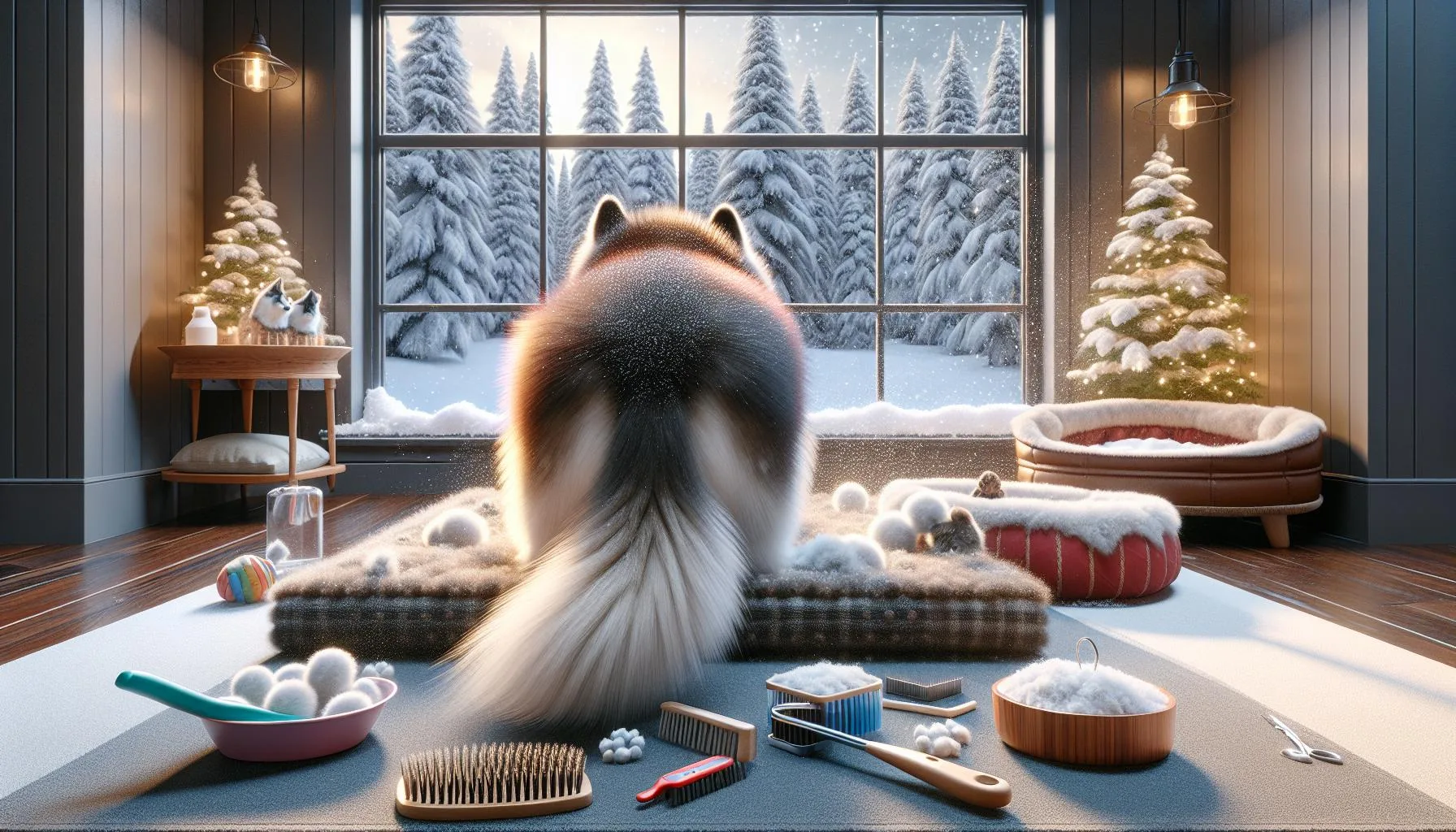
The Basics of Brushing and Combing
Winter Grooming and Care for Husky Newcomers
To ensure Winter Grooming and Care for Husky Newcomers, it is crucial to establish a regular brushing and combing routine. Huskies have a thick double coat that requires special attention, especially during the colder months.
Begin by using a wide-toothed comb to gently work through any tangles or mats in the outer coat. Then, switch to a slicker brush to remove loose fur and distribute natural oils, which helps to maintain the coat’s insulation properties.
It’s essential to brush in the direction of hair growth to prevent discomfort for your husky. Additionally, consider using a de-shedding tool to minimize shedding, especially as the warmer months approach.
This will help keep your husky’s coat healthy and reduce the amount of loose hair around your home. Remember, consistency is key in keeping your husky’s coat in top condition throughout the winter..
With the colder months taken care of, ensure your husky stays just as comfortable when the temperatures rise. Discover strategies to maintain your husky's cool demeanor through the summer at these expert tips for a chill husky in the heat.
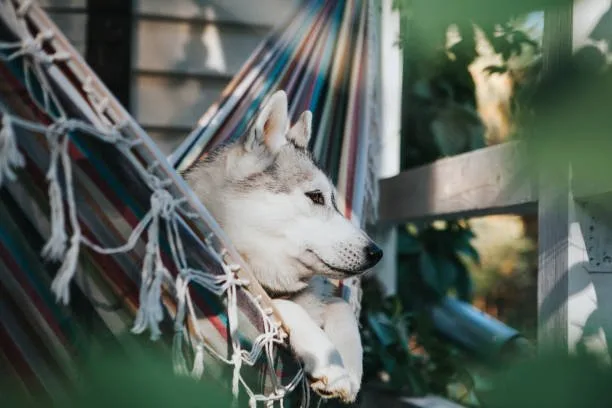
Protecting Paws from Winter Hazards
Winter Grooming and Care for Husky Newcomers
During the winter season, it’s essential to pay close attention to your husky’s paws to protect them from potential hazards. Ice, salt, and other cold weather irritants can cause discomfort and even injury.
To prevent these issues, consider using protective booties when taking your husky for walks in snowy or icy conditions. These booties provide a barrier between their paws and the cold ground, reducing the risk of irritation and injury.
Additionally, applying a specialized paw balm can help moisturize and protect their paw pads from the harsh elements. This forms a protective layer, guarding against dryness and cracking, which is especially important in areas where salt or other de-icing chemicals are used.
Remember to regularly inspect your husky’s paws for any signs of irritation or damage, and seek veterinary attention if needed to ensure their paw health throughout the winter season. Winter Grooming and Care for Husky Newcomers should always include close attention to paw protection to keep your furry friend comfortable and healthy..
Explore additional insights and strategies tailored to the well-being of your senior Husky, particularly when it comes to managing their separation anxiety. Delve into innovative tech solutions that can help ease your older companion's distress and improve their quality of life.

Watching Out for Skin Issues
Huskies are susceptible to various skin issues during the winter months, including dryness and irritation. It’s crucial to monitor their skin for any signs of discomfort or abnormalities.
Keep an eye out for dry, flaky patches, redness, or excessive itching, as these could indicate a problem. To prevent skin issues, ensure your husky has a well-balanced diet that supports skin health, and consider adding supplements like fish oil rich in omega-3 fatty acids.
Additionally, bathing your husky with a gentle, moisturizing shampoo can help alleviate dryness without stripping natural oils from their skin. Remember to consult a veterinarian if you notice any concerning changes in your husky’s skin to address the issue promptly.
Providing proper Winter Grooming and Care for Husky Newcomers will help maintain their skin health and overall well-being.
Winter Grooming and Care for Husky Newcomers
To ensure your husky's well-being extends beyond skin care, understanding their emotional needs is equally important. Explore our comprehensive guide on the common causes of distress and how to soothe your husky puppy's cries at "Understanding Your Husky Puppy's Tears: A Guide to Comfort and Care."
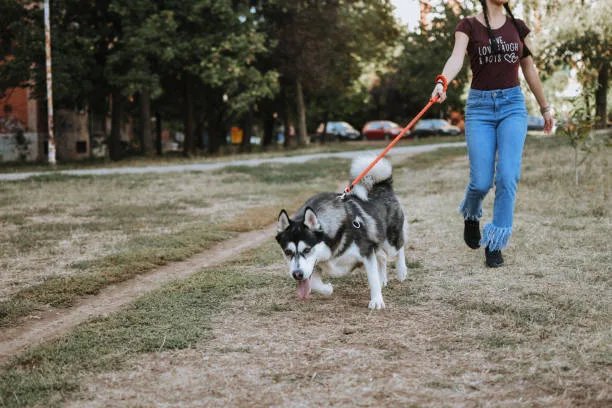
Adequate Nutrition and Hydration
Proper nutrition and hydration are vital components of Winter Grooming and Care for Husky Newcomers. Huskies require a balanced diet rich in essential nutrients to maintain their coat’s health and overall well-being during the colder months.
Additionally, ensuring they have access to sufficient water is crucial for keeping them hydrated, as the dry winter air can contribute to dehydration.
It’s essential to provide a high-quality diet that meets the specific nutritional needs of huskies, including a well-balanced mix of proteins, fats, and carbohydrates.
This helps support their energy levels and maintain a healthy coat, which is especially important during the winter when their natural insulation is relied upon.
- Offering adequate hydration is equally important as it supports various bodily functions, aids in digestion, and helps regulate body temperature.
- During the winter, it’s essential to monitor their water intake and ensure that their water supply doesn’t freeze in low temperatures.
By focusing on their nutrition and hydration, husky owners can help their pets stay healthy and comfortable throughout the winter season, contributing to the overall Winter Grooming and Care for Husky Newcomers.
To delve deeper into ensuring your husky's peak well-being this winter, explore our comprehensive guide on adhering to the AKC guidelines for their care. Uncover the secrets to maintaining their majestic coat and robust health with our detailed article on the "AKC Siberian Husky Standard: Achieve Optimal Care Today!"
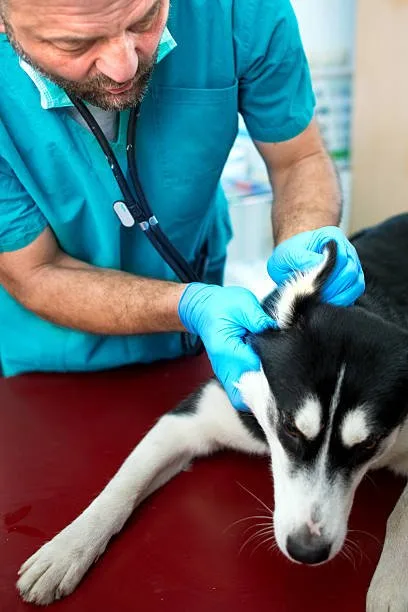
Exercise and Mental Stimulation in Winter
During the winter months, it’s essential to ensure that your Husky remains active and mentally stimulated despite the challenges posed by the colder weather. To keep your pet engaged, incorporate indoor activities that promote physical exercise and mental agility.
Activities such as hide and seek with toys or treats, interactive puzzle toys, and obedience training not only provide physical stimulation but also keep the Husky’s mind sharp. Indoor playtime can include supervised fetch or tug-of-war to maintain their physical activity levels.
When outdoor conditions allow, choose safe areas for brisk walks or runs, ensuring that your Husky gets the exercise they need. Always monitor the outdoor temperature and your dog’s tolerance for cold weather, and consider investing in pet-safe de-icing products to create a safe outdoor space.
By consistently providing both physical and mental stimulation, you can help your Husky stay active and engaged even on the coldest days of Winter Grooming and Care for Husky Newcomers..
With your husky now well-exercised and mentally satisfied, it's important to keep them clean and healthy too. Discover expert tips on giving your furry friend the best bath experience by reading our guide on properly washing a husky puppy.

Professional Grooming Services for the Season
Professional grooming services can be particularly beneficial for huskies during the winter season. They often require specialized care due to their thick double coat, which can be challenging to maintain without the proper expertise and tools.
Groomers experienced with huskies understand the specific needs of their coat, such as the frequency of brushing and the type of grooming tools required to minimize shedding and matting.
On Quora about: Winter Grooming and Care for Husky Newcomers
These professionals are also well-equipped to handle husky-specific grooming challenges that may arise during the winter months. For example, they can address dry skin issues by recommending suitable bathing techniques and products that promote skin hydration.
Groomers can also provide valuable insights into protecting a husky’s paws from winter hazards, such as ice and salt, through the use of paw balms and booties.
For comprehensive insights on optimizing your husky's diet this winter, explore our detailed guide on the dietary benefits of eggs for your furry friend. Delve into the essentials of husky nutrition by reading the best dietary practices for huskies.
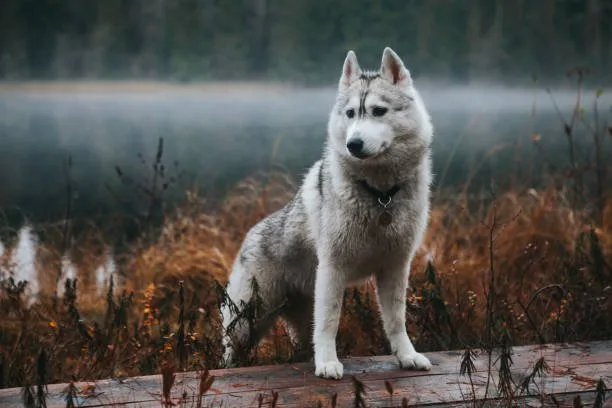
Optimizing Husky Coat Health in Winter
American Kennel Club: Winter Grooming and Care for Husky Newcomers
Huskies feature a magnificent double coat that requires special attention during the winter months. To optimize their coat health, regular brushing is crucial.
By using a combination of an undercoat rake and a slicker brush, husky owners can effectively remove loose fur and prevent matting. Grooming should be done at least 2-3 times a week to manage shedding, which is particularly prominent before and after winter.
Additionally, paying attention to the type of brush used is essential as it helps in effectively managing the thick undercoat without damaging the topcoat. Proper grooming not only ensures a healthy and shiny coat but also helps in controlling shedding around the house..
Maintaining your Husky's double coat is just the beginning of ensuring a happy and harmonious life for your furry friend. Explore our guide on fostering a peaceful coexistence between your Husky and feline friends by visiting "Fostering Harmony: Training Your Husky to Coexist with Cats" for expert advice.
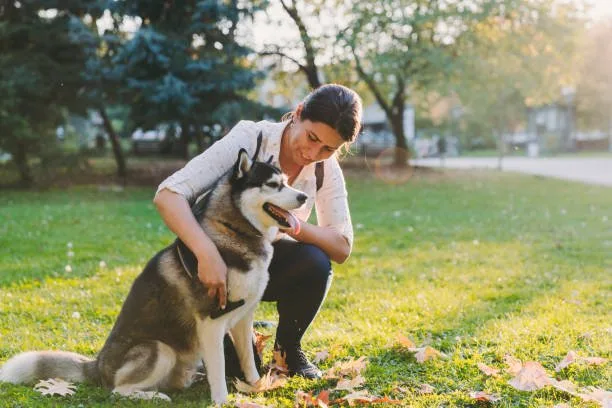
Enhancing Winter Nutrition and Exercise for Huskies
Huskies have increased energy needs during the winter months, requiring special attention to their nutrition and exercise regimens. It’s crucial to provide them with a balanced, nutrient-rich diet to support their active lifestyle.
This means adjusting their food intake to accommodate the lower temperatures and ensure they receive adequate nourishment. Additionally, incorporating regular winter exercises and engaging indoor activities is essential to keep them mentally and physically stimulated.
Implementing these practices will contribute to the overall wellbeing of huskies in the colder months.
Reddit Winter Grooming and Care for Husky Newcomers
- Provide a balanced, nutrient-rich diet to support the active lifestyle of huskies during winter.
- Adjust feeding routines to accommodate lower temperatures and ensure sufficient nourishment.
- Incorporate regular winter exercises and engaging indoor activities to keep huskies mentally and physically stimulated.
To delve deeper into ensuring your Husky thrives in the chilly months, explore our comprehensive guide on allergy-friendly practices and accommodations that cater to the unique needs of husky owners. Discover essential tips and strategies for a happy, healthy husky in winter—secure your spot to learn more about allergy-friendly husky care today.

Countering Winter Weather: Protecting Husky Paws and Skin
Huskies are resilient dogs, but their paws and skin require special attention during the winter months. The icy ground and salt used on sidewalks can cause discomfort and even injury to their sensitive paw pads.
To protect their paws from these harsh winter elements, consider using booties specially designed for dogs. These will provide a barrier against the cold and prevent the accumulation of ice and salt between their toes.
Additionally, applying paw balms can help moisturize and create a protective layer on their paw pads, reducing the risk of dryness and cracking. When it comes to bathing your husky in winter, opt for gentle, moisturizing shampoos to prevent their skin from drying out.
It’s crucial to ensure their coat and skin remain healthy and hydrated during these colder months. Lastly, incorporating other breed-specific care practices, like regular checks for any signs of irritation or injuries on their paws, will contribute to comprehensive winter grooming and care for Husky newcomers.
For comprehensive winter grooming and care for Husky newcomers, consider the following:
- Use protective booties to shield their paws from icy surfaces and salt on sidewalks.
- Apply paw balms to moisturize and protect their paw pads from dryness and cracking.
- Opt for gentle, moisturizing shampoos during bathing to prevent skin dryness.
- Regularly check for signs of paw irritation or injuries to ensure their well-being.
.
Keeping your Husky's paws and skin safe through winter is just the beginning; ensuring their overall well-being is paramount. Discover another dimension of Husky care as you explore how to introduce these energetic dogs to aquatic environments safely in our detailed guide to Huskies and swimming.
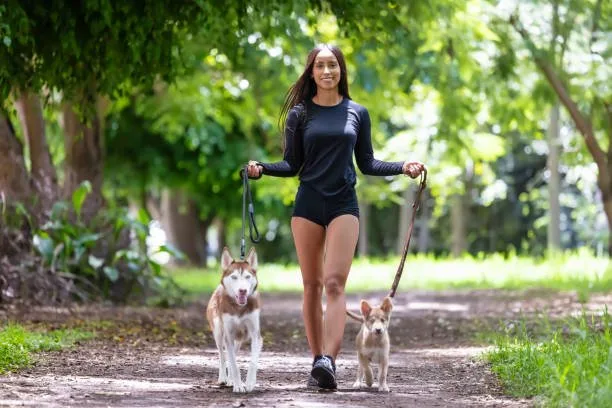
Cold Climate Adaptation: Safeguarding Your Husky’s Health
Huskies are naturally equipped to handle cold climates, but it’s essential to take proactive steps to safeguard their health during the winter months. Keep an eye out for signs of potential health issues such as frostbite or hypothermia, including shivering, lethargy, and unusual behavior.
Despite the cold, socialization remains crucial for huskies, so ensure they have regular interactions with other dogs and humans. Additionally, outfit your husky with appropriate outdoor gear like a well-fitted coat or boots to protect against winter hazards and keep them comfortable during walks or outdoor activities.
Remember, by leveraging their natural cold tolerance and taking preventative measures, you can help your husky thrive even in the chilliest of climates. Winter Grooming and Care for Husky Newcomers..
For comprehensive insights on optimizing your senior Husky's well-being through tailored nutrition and physical therapy programs, delve into our detailed guide. Explore the invaluable strategies and tips to enhance your loyal companion's golden years by visiting "Improve Your Senior Husky's Health with Special Diet and Therapy."
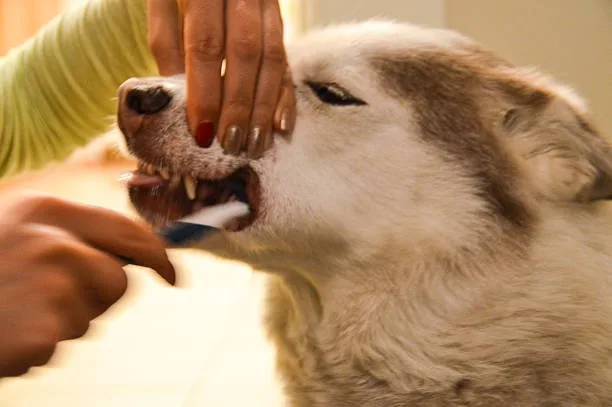
Special Considerations for Husky Puppies and Senior Dogs in Winter
Husky puppies and senior dogs require special attention during the winter months. Proper socialization is crucial for husky puppies to ensure they become well-adjusted adults.
It’s important to introduce them to various winter-related stimuli such as snow, colder temperatures, and different outdoor surfaces. This exposure will help them feel more comfortable and confident in their environment as they grow older.
Additionally, monitoring their outdoor activities is vital as they may not be accustomed to the cold for extended periods. As for senior husky dogs, adjustments to their nutritional intake may be necessary during winter.
Older dogs may have different dietary needs, and consulting with a veterinarian to ensure they are receiving adequate nutrients is essential. Moreover, regular monitoring for any signs of discomfort or health issues, such as stiffness or arthritis, is crucial during the colder months.
Overall, taking these extra considerations into account will help ensure the well-being of husky puppies and senior dogs during the winter season. Winter Grooming and Care for Husky Newcomers..
While tending to the needs of your Husky in the colder months is crucial, understanding the growth patterns of other breeds can also enhance your care strategy. Explore the growth expectations for a Boston Terrier Chihuahua Mix and learn how their size affects their winter care needs at The Growth Stages of a Boston Terrier Chihuahua Mix.

Summary of Winter Grooming for Huskies
Winter Grooming and Care for Husky Newcomers is crucial for maintaining the health and comfort of these unique dogs during the colder months. From understanding their double-layered coat to protecting their paws from winter hazards, every aspect of grooming and care plays a vital role in ensuring the well-being of Huskies in winter.
Regular brushing and combing are essential to manage the shedding and matting of a Husky’s coat, while also promoting healthy skin and fur.
Bathing should be approached with caution, considering the harsh impact of colder temperatures on their skin and coat. Additionally, being mindful of potential skin issues and ensuring adequate nutrition and hydration are key elements in Husky care during winter.
Engaging Huskies in regular exercise and providing mental stimulation is equally important as it contributes to their overall well-being and helps counter the effects of shorter days and colder weather.
Lastly, seeking professional grooming services when necessary can provide expert assistance in maintaining their coat and addressing any specific winter-related grooming concerns.
In summary, Winter Grooming and Care for Husky Newcomers encompasses a comprehensive approach to meeting the unique needs of these remarkable dogs, ensuring they remain comfortable, healthy, and happy throughout the winter season.
As we emphasize the significance of tailored winter care for husky breeds, it's vital to also celebrate the companionship they offer. Dive into the heartwarming world of canine loyalty and adventure with Country Living's selection of 40 Top Dog Movies Available for Streaming.

Leave a Reply